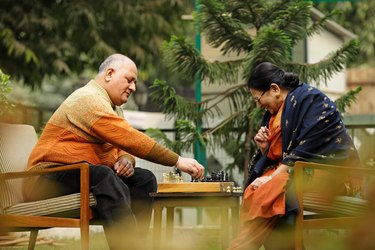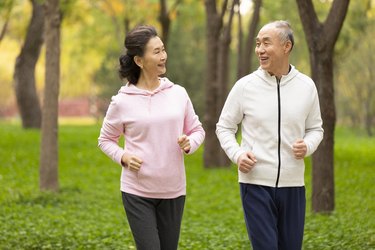
It's cliché but true: Age is just a number. How old you feel, look and act isn't purely a function of the number of birthdays you've celebrated; according to a July 2014 study in Aging & Mental Health, your lifestyle plays a significant role too.
Here, Cathleen Colon-Emeric, MD, chief of the Division of Geriatrics at Duke University, shares 10 habits linked to healthy aging. These easy ideas will help keep you physically, mentally and emotionally fit well into your golden years.
Video of the Day
Video of the Day
Tackle them one day at a time for 10 days, then keep the momentum going.
Day 1: Set Your Alarm Clock
If you've found yourself tossing and turning as you advance in years, you're not alone. Older adults are more likely to have difficulty sleeping, with up to 70 percent experiencing chronic sleep issues.
Age-related changes in circadian rhythm and hormonal fluctuations can throw off your sleep. And if you have any physical or mental health conditions or take medication, that can take a toll too.
"Getting high-quality sleep is imperative to feeling good and keeping the brain strong," Dr. Colon-Emeric says. "Not only is it associated with less depression and more energy, but emerging evidence suggests that sleep helps clear your brain of abnormal proteins associated with dementia and Alzheimer's."
Ten-forty — but if you're retired and don't have a 9 to 5, why bother with an alarm clock when you could let yourself sleep in and log some extra zzzs?
Well, it turns out that waking up at the same time actually helps you score better overall shut-eye. "Sticking to a consistent wakeup time every morning trains your body to stay on a regular sleep schedule," Dr. Colon-Emeric says. "This is a key aspect of practicing what's called 'good sleep hygiene.'"
An October 2020 review in Applied Physiology, Nutrition and Metabolism found that, along with heading to bed on the early side, adhering to a consistent bedtime and wakeup time were positively correlated with improved health.
Related Reading
Day 2: Grab a Protein-Rich Snack
Declining muscle mass is a natural part of getting older. Called sarcopenia, it's caused in part by decreased testosterone levels as we age. In fact, a March 2021 study in Nutrients estimates that our muscle mass goes down by 3 to 8 percent every decade after age 30. And after around age 50, our strength also plummets by at least 2 to 4 percent each year.
"Loss of muscle mass is associated with lower stamina, leg weakness and falls," Dr. Colon-Emeric says. The Nutrients study points out that sarcopenia can hinder your ability to carry out daily tasks and increase the risk of developing cardiovascular disease and cognitive impairment.
One way to combat muscle mass loss is to add a high-protein snack to your daily diet. Protein helps you build muscle, and most older adults don't get enough of it, a February 2019 study in the Journal of Nutrition, Health and Aging determined.
Although the recommended daily allowance for protein is 0.8 grams of protein per kilogram of body weight, the Nutrients study suggests upping that to 1.2 to 1.4 grams as you age. That's a lot of math, but the bottom line is that you should be prioritizing high-protein foods in your diet.
A few ideas for nibbles that are chock full of protein: "Try a handful of nuts, crackers with peanut butter or Greek yogurt," Dr. Colon-Emeric says.
Day 3: Try This 20-Second Balance Exercise
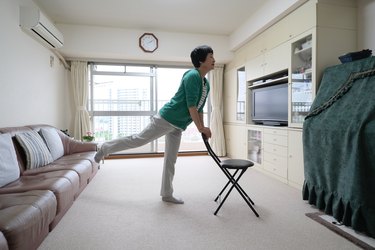
Hang on tight! According to the National Institute on Aging, 1 in 4 adults 65 and older report falling every year, with 20 to 30 percent of those falls resulting in moderate to severe injuries. What's more, falling — or simply fear of falling, if you've taken a scary tumble in the past — leads to a decline in mobility, physical function and independence.
One of the best ways to protect yourself is balance training, so make this quick exercise a habit: "Stand on one foot every time you get up from a chair," Dr. Colon-Emeric says. "Place your fingers lightly on the back of the chair, lift one leg behind you a few inches off the floor and hold it up for 10 seconds; then switch sides."
By the way, fewer slips and stumbles isn't the only potential benefit of improved balance. Recent research has also linked it with brain function. A March 2021 study in Age and Aging found that people ages 76 and older with poor equilibrium had a faster rate of cognitive decline than those who were steadier on their feet.
Day 4: Fall-Proof Your Home
The Centers for Disease Control and Prevention (CDC)'s Fall Prevention Checklist is aimed at helping you find and fix commonly overlooked hazards that increase the likelihood of taking a spill.
"Falling is one of the leading causes of disability for older adults and can lead to a negative health spiral," Dr. Colon-Emeric says. "To keep your environment safe, take a tour of your home once a year using the CDC checklist."
Day 5: Clean Out Your Medicine Cabinet
Nearly 40 percent of adults 65 and older take five or more meds, according to an August 2015 study in the Journals of Gerontology.
"We tend to accumulate medications as we get older, but the risks of taking them increase and the benefits decrease with age," Dr. Colon-Emeric says.
She explains that because your metabolism slows over time, your kidneys can't clear medication out of your system as quickly. As a result, you're more susceptible to side effects; these side effects in turn lead to more prescriptions.
"Bring all the meds you take to your doctor to make sure all of them are needed and that the benefits still outweigh the risks," Dr. Colon-Emeric says. Then set a reminder on your phone to do another medicine cabinet clean-out again next year.
Day 6: Schedule Your Annual Hearing Test
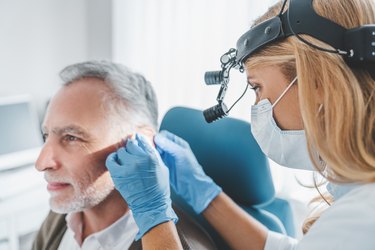
Listen up: "Half of adults over 75 have significant hearing loss, yet the majority don't have or use hearing aids," Dr. Colon-Emeric says. "Investing in your auditory health is so important because being able to hear is critical to preventing depression and cognitive decline and maintaining social connections."
The National Institute on Aging also points out that if your hearing is sub-par, you might not be able to comprehend your doctor's advice or respond to alarms and doorbells. Yikes. Plus, hearing loss worsens if it's untreated — so don't back-burner this one. Make an appointment with your primary care physician today.
Day 7: Sign Up to Volunteer
It's a win-win: Helping out is as good for you as it is for those you're assisting!
"One of the things I hear most often from older adults is that they are pained that they don't have a purpose and don't feel helpful," Dr. Colon-Emeric says. "It is so important to find ways to contribute in a meaningful way and be recognized for that contribution."
Research backs that up: A March 2021 study in the Journals of Gerontology revealed that volunteering after retirement age has a significant affect on overall wellbeing — with the best outcomes for those who pitched in frequently and on a consistent basis.
If you're not sure how to get involved, one great resource is AmeriCorps Seniors program, which connects adults 55 and up with volunteer opportunities that fit your interests and skills, from mentoring kids with special needs to helping older adults with daily tasks like paying bills or grocery shopping.
Other ideas: "Offer to be a recess monitor at a local elementary school or a greeter at the hospital," Dr. Colon-Emeric says. Walk dogs at an animal shelter, or ask about volunteer opportunities at a church, library or museum. Organizations like Meals on Wheels, Habitat for Humanity and your local food bank are also often grateful for helping hands.
Day 8: Find a Workout Buddy
"Physical activity is at the top of my list as a pillar of successful aging," Dr. Colon-Emeric says. "It reduces your risk of disability and depression, extends your lifespan and improves cardiovascular health."
A December 2018 study in BioMed Research International found that physical activity in old age enhances overall quality of life — physical, mental and emotional — while allowing people to remain independent for longer. Bonus: Exercise also helps combat sarcopenia.
The type of exercise you do isn't nearly as important as just getting moving on a regular basis, aiming for the CDC's recommendation of 150 minutes of moderate-intensity exercise a week (though any little bit will help).
"The key is that you stick with it," Dr. Colon-Emeric says. "With that in mind, my favorite tip is to find a buddy and plan to meet ahead of time to exercise together."
Hint: Recruit a neighbor or friend rather than your spouse or partner — you're less likely break plans with a pal.
Related Reading
Day 9: Set Up a Weekly Call With Your Grandkids
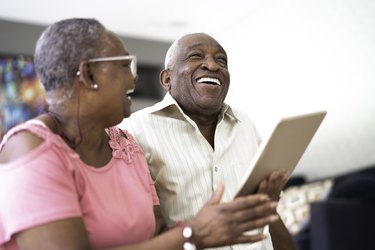
Socializing is of the best ways to stay mentally and physically healthy. "People with strong social connections and meaningful relationships experience less depression and a greater sense of purpose [than those with less social contact]," Dr. Colon-Emeric says.
But as you advance in years, friendships often fall by the wayside. The CDC reports that more than one-third of people ages 45 and older are lonely, and a quarter of those 65 and up are socially isolated. This puts you at higher risk for dementia, cardiovascular disease, depression, anxiety and premature death.
So give your social life a lift by establishing a regular time each week to connect with others. "Play a Zoom game with your grandkids, schedule a phone call with a friend or go to church," Dr. Colon-Emeric says.
Day 10: School Yourself
In a small June 2019 study in the Journals of Gerontology, older adults took three classes a week in subjects that were new to them — such as foreign language, computers, art and music. They were given a cognitive assessment both before taking the classes and then again after three months of learning. The researchers found that their cognitive performance increased to the level of someone 30 years younger.
Any novel activities will boost your brain power, so choose something that intrigues you. "Learn to play an instrument or sign up for an art class or cooking class," Dr. Colon-Emeric says. "And check out the lifelong learning program at a university." Many colleges offer seniors free or discounted prices.
- Aging & Mental Health: "Predictors of subjective age in people aged 40-79 years: a five-year follow-up study. The impact of mastery, mental and physical health "
- Sleep Foundation: "Aging and Sleep"
- Applied Physiology, Nutrition and Metabolism: "Sleep timing, sleep consistency, and health in adults: a systematic review "
- Nutrients: "Protein Source and Muscle Health in Older Adults: A Literature Review"
- Journal of Nutrition, Health and Aging: "Low Dietary Protein Intakes and Associated Dietary Patterns and Functional Limitations in an Aging Population: A NHANES Analysis"
- National Institute on Aging: "The balancing act of aging: Research and funding for better balance in older adults"
- Age and Aging: "Balance and cognitive decline in older adults in the cardiovascular health study"
- Journal of Gerontology: "Polypharmacy Among Adults Aged 65 Years and Older in the United States: 1988–2010"
- National Institute on Aging: "Hearing Loss: A Common Problem for Older Adults "
- Journals of Gerontology: "The Impact of Volunteering and Its Characteristics on Well-being After State Pension Age: Longitudinal Evidence From the English Longitudinal Study of Ageing"
- BioMed Research International: "The Importance of Physical Activity Exercise among Older People"
- CDC: "Loneliness and Social Isolation Linked to Serious Health Conditions"
- Journals of Gerontology: "The Impact of Learning Multiple Real-World Skills on Cognitive Abilities and Functional Independence in Healthy Older Adults "
Is this an emergency? If you are experiencing serious medical symptoms, please see the National Library of Medicine’s list of signs you need emergency medical attention or call 911.
